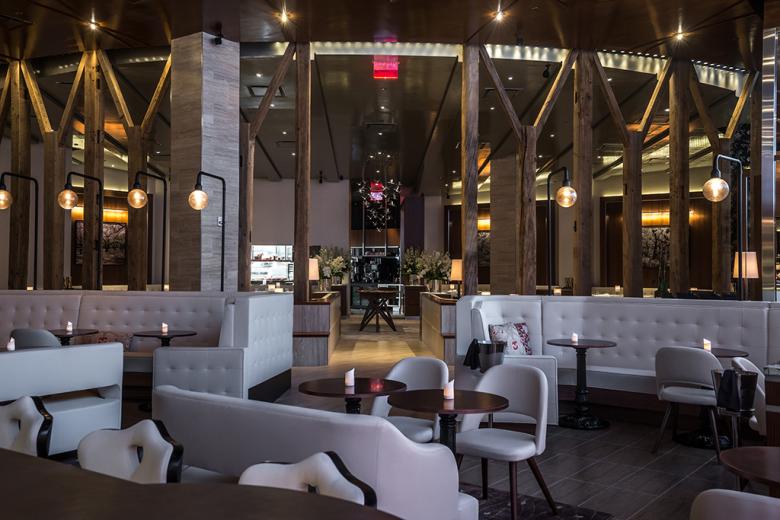1 12
Gabriel Kreuther's modern salute to Alsace, executed by Glen & Co. Architecture.
"It was important to us that the lounge and dining room not feel like two separate rooms. To make sure there was separation but visibility, we created pathways similar to town squares, and custom lamp posts similar to [those found in] Gabriel’s grandfather’s hometown. Also, the curve of the posts forms a soft and sensuous line [around the dining room]."
"These wooden posts are on their second life. They’re actually reclaimed from an 1880s-era barn in Vermont. They’re in their natural state, exactly how they came out of that structure. We used them to reflect traditional Alsatian architecture. You see this stick style in Alsace and Lorraine. It’s common to see homes with exposed wood elements that are vertical and diagonal. We used that idea to create a modern Alsatian style."
"Color is hard to do in a restaurant when you know the menu changes seasonally. Accents—copper panels and green onyx stripes at the bar—give a pop of color. We introduced color in the pillows and other accessories as well."
"We included it to let people know there is an opportunity to make their friends jealous and book the eight-person chef’s table in the kitchen! Also, to expose the process a little bit and take the fine dining element down by just a slight notch. You only see the finishing area and the pastry [workspace]. The drapes are closed at the end of the night when they’re breaking down or if the guests at the chef’s table want privacy."
"There was never a moment when the tablecloths weren’t a certainty for Gabriel Kreuther. Some food critics have said fine dining is dead, but it’s just not true, and it will certainly never leave New York. Fussy? No. Elegant and sophisticated, yes."
"Chef Kreuther and his general manager [Thierry Chouquet] picked out all of the tableware. It wasn’t custom, but Gabriel Kreuther is the first U.S. restaurant in which this silverware was used. Gabriel is a man of detail. The handles are longer than typical knives, fork and spoons to accommodate the wide rims of the plates and bowls. Gabriel didn’t want [the silverware] to slide down into the vessel. There are lefty and righty forks and spoons. If the server notices a guest is a lefty, he or she subtly swaps it out at the next course."
"We designed the wallpaper. It’s a classic floral pattern you’d find [in the region], but with a slightly larger scale. We chose a metallic [finish] to provide some reflection. It’s on the wall perpendicular to the park."
"The stork is an important symbol in Alsatian folklore. It represents rebirth. We custom designed this [wallpaper] as a modern homage."
"The last piece [of the restaurant] we couldn’t decide on was a chandelier. We had a custom table for the center of the dining room and we had planned for [a chandelier] over it, but we had to nix it because of the budget. We had been working with a custom glass artisan to do something with storks, and it occurred to us: why not put a cluster of them over the table with some recessed lights? It was the perfect solution."
"I love the barstools. Gabriel and I were at another restaurant [Glen & Co.] designed, Bâtard and I was sketching out some barstool ideas when [co-owner] Drew Nieporent came over, looked at the drawing and said, “Hearts—the symbol of hospitality in Alsace, right?” We took that as a sign that it was a good idea! Drew is right. It’s similar to the pineapple symbol, and hearts are seen in different manifestations around Alsace. When we had the stools all lined up at the bar, Gabriel’s sommelier [Emilie Perrier] stepped back and said, 'This, my friends, is how Chef Kreuther says: Welcome to my restaurant.’”
"Everything the guest touches is really important. The antique solid brass door handle was found by one of the partner’s wives on a trip to Strasbourg. The pillows feel lush and cozy and make the dining experience easier if you’re there for three hours."

